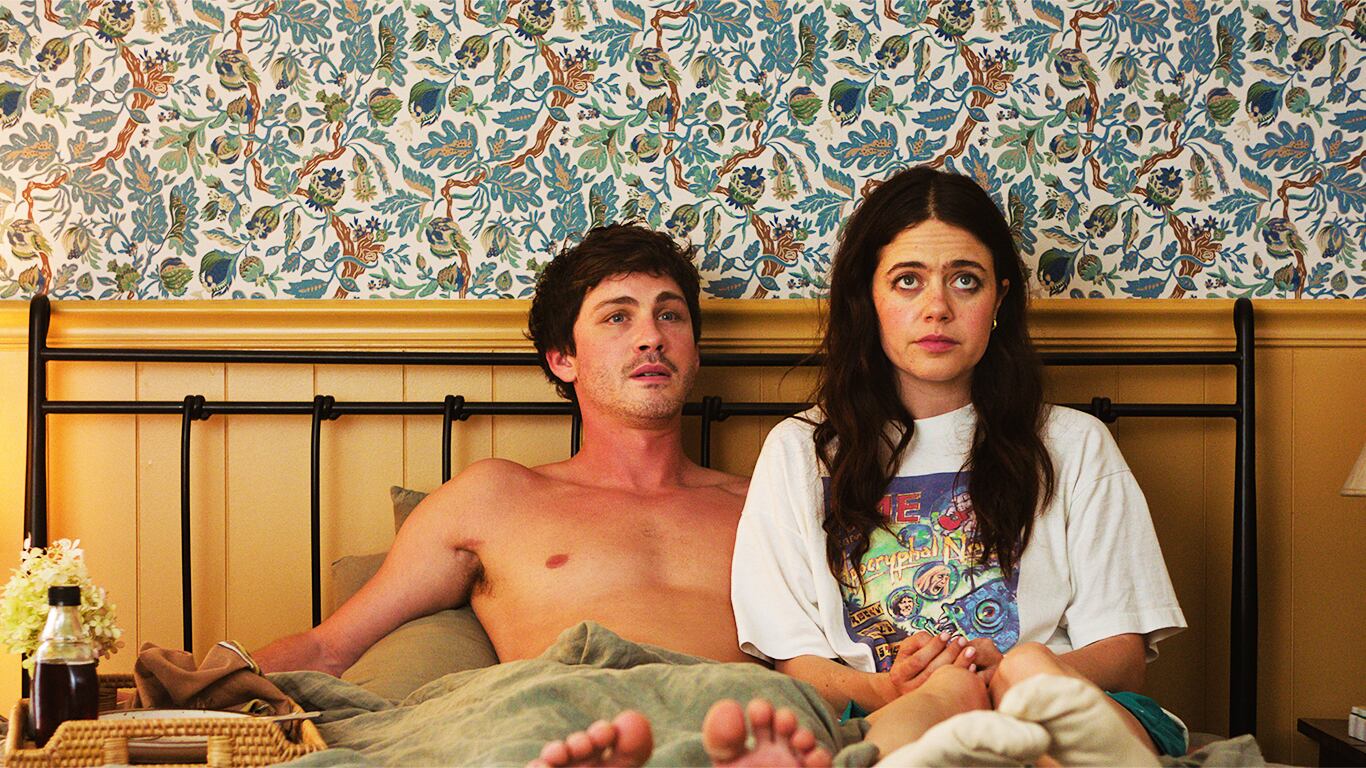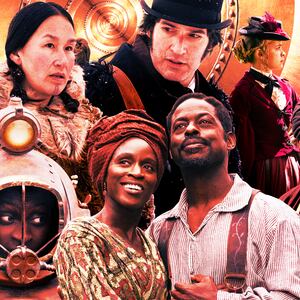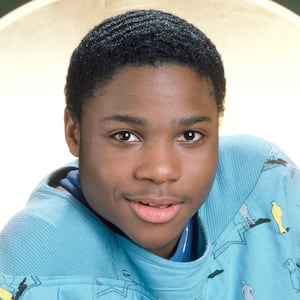Modern dating is its own horror story, and writer-director Sophie Brooks deftly weaves elements of the genre into her new rom-com Oh, Hi!.
The film starts out lighthearted, with thirtysomethings Iris (Molly Gordon) and Isaac (Logan Lerman) on their first weekend getaway as a couple. Or at least that’s what Iris thinks.
They’ve been dating for four months but Isaac, it turns out, hasn’t seen this as an exclusive relationship at all. Following this revelation, the couple’s easy banter is abruptly replaced by thorny arguments.
Candlelit dinners slowly give way to the cold hard light of morning. The film goes from sweet to Stephen King territory when a desperate Iris leaves Isaac tied to their bed, hoping he’ll change his mind, growing increasingly unhinged when he doesn’t.
Ahead of the film’s domestic premiere, Brooks spoke about her cinematic references, subverting Lerman’s status as the Internet’s Boyfriend, and what plagues her about dating today:
The film really nails how there are labels for everything now, but also this pervasive avoidance of labels at the same time. In one scene, Iris’ best friend explains the difference between a “softboy” and “f---boy.” Isaac, on the other hand, uses terms like “hanging out” or “having fun” to avoid defining the relationship. Was there something specific about contemporary dating that you wanted to explore with Oh, Hi!?
It’s such an interesting concept—that you could be dating someone for four months and the idea of labeling that feels too much or overwhelming or makes you crazy. I thought it was quite funny when I bumped up against this in my own life and in my friends’ lives. Ten years ago, I don’t think this was the case.

Before dating apps and Instagram had become what they are now, a lot of these terms didn’t exist. “Love bombing” didn’t exist, “situationships” didn’t exist. Even though there’s always been people who want different things out of the same relationship, the cultural norm of a situationship being acceptable behaviour is quite new. We’ve seen certain things excused as the norm and when you’re someone who wants love or wants a relationship, you can sometimes be the collateral damage of this system.
Can you walk me through your cinematic references? The initial stretch of Oh, Hi! is quite romantic and Iris even references Casablanca (1942), but a Stephen King-esque vibe soon seeps in. I’ve seen people mentioning Misery (1990) but the handcuffing also felt very Gerald’s Game (2017) to me.
I’ve actually never seen Gerald’s Game. It was brought up to me a few times during the development process and I made the choice not to watch it because I didn’t want to accidentally steal anything from it. Misery was an immediate reference because of the context of a woman chaining a man to a bed, but it’s obviously a different tone here.
Iris is not a bad person who’s trying to hurt Isaac; she’s just trying to find and hold on to love. I was thinking of my favourite romantic comedies as references—I’m a big fan of Noah Baumbach and Nora Ephron and Nicole Holofcener and how they use their lives in their work to different degrees of specificity.
My cinematographer Conor Murphy and I also watched A Bigger Splash (2015) and The Worst Person in the World (2021), stories of messy women and films set in mainly one location. I also love Notting Hill (1999) and Four Weddings and a Funeral (1994) and how Richard Curtis has such a way with dialogue. It feels so human and clumsy in some ways and I try to work that clumsiness and authenticity into my dialogue.
Iris googling “how to make a guy realize he wants you” is funny, but it’s still in the realm of possibility. Then her behavior slowly gets more irrational and she eventually looks into a more supernatural solution, like a witches’ potion. How did you figure what her spiral would look like and how far you wanted to take it?
That desire to go to the internet for answers is something we all experience now. It’s certainly something I do — the number of times I’ve googled “weird rash on my elbow” only for it to tell me, “You have arm cancer.” It’s natural to turn to the internet and immediately regret it and then go down a path of bad advice. I thought that was relatable and also funny.
It’s definitely relatable.
With the witch stuff, I was really leaning into these tropes about women—women being witches and being burned at the stake. I was obsessed with witches when I was a little girl. My favorite TV show was Charmed and I just really thought that I was a witch and that I’d find out after puberty. I was praying. When that didn’t happen, I was genuinely disappointed. I had this whole plan for my life! And I wanted to lean into that in a tongue-in-cheek way but also as a commentary on what it means to be a woman, a “crazy” woman and also a single woman.
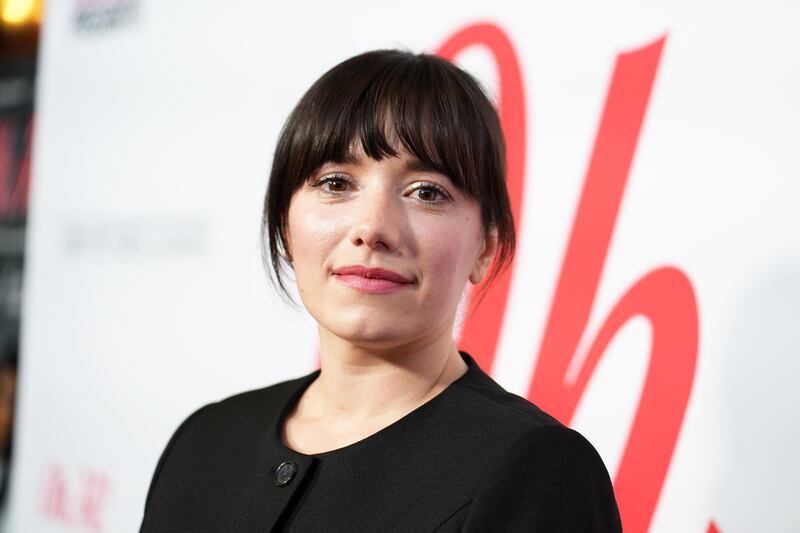
That’s something a lot of people who have seen the film are responding to.
Something that was in the movie and that got cut out was a story about the origin of witches—during the plague, all of these single women with cats weren’t getting sick and no one could figure out why and all the men in the community decided they were witches. In reality, their cats were killing the rodents that were causing the plague. The idea that a single woman is equal to a witch was so juicy and interesting.
The moral of the film is that you shouldn’t have to convince someone to want you, so I hope that no one does a spell to convince someone who isn’t right for them to be with them. But I also think there’s something very powerful about a woman leaning into her will.
Logan Lerman and Molly Gordon have great romcom chemistry here, but you’ve said before that many men didn’t want to be a part of the film. Do you know what their hangups were?
Isaac is a character who could be really unlikeable. We call him a “softboy,” some women would call him a “f---boy.” And I think it’s scary to play a character that could be torn apart. Logan is a truly skilled actor and so dedicated to his craft but he’s also a lovely, nuanced person who wasn’t afraid of that and was actually interested in it.
Isaac isn’t the bad guy, but he also isn’t a good guy. He has all these complexities. I never wanted that role to be black-and-white. Most people want love and most people have good intentions but we also have our hangups and our baggage. Isaac’s limit him from being vulnerable. I also think the fact that he’s chained to a bed for half a movie—it takes a special kind of actor to be willing to be that limited in his mobility and also to be shirtless for half the film. So I get it, it was a tricky role to cast but Logan was my dream Isaac.
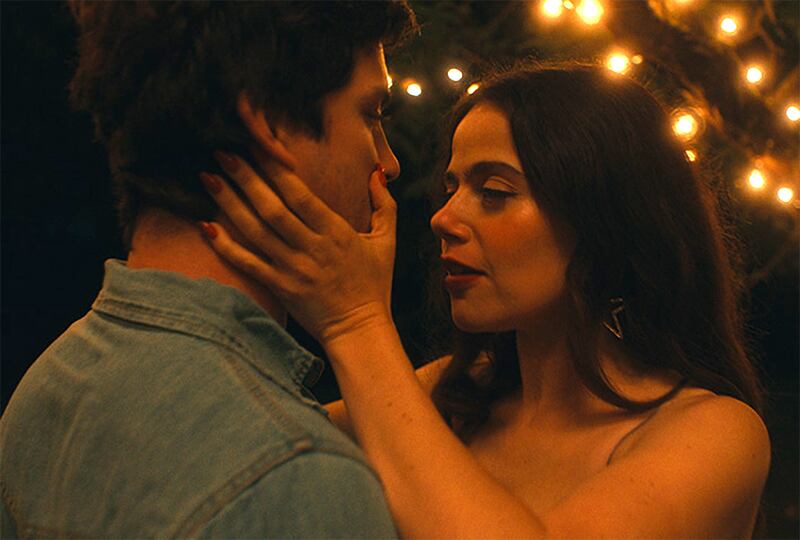
It’s also such an interesting subversion of his image as the Internet’s Boyfriend.
Exactly. I wonder if that’s why it wasn’t as scary to him, because he’s someone who’s quite wholesome. He’s engaged, he’s in a committed relationship and so there was never a fear of him being perceived as that guy. He’s not.
Before things go south, there’s such a playfulness to the film’s sex scene. Could you tell me about approaching it at the scripting stage and then on set? Did you have an intimacy coordinator?
We did, and she was incredible. We did some rehearsals beforehand to make sure everyone felt good and was on the same page. A lot of the pre-sex scene stuff, when they’re in their underwear and playing around, was improvised. Our intimacy coordinator was in the room but I just let them play around and saw what came up.
This movie doesn’t work if it doesn’t have a sex scene— it’s how Isaac gets tied up. It was always going to be part of the film but I, as a younger writer, was quite scared of sex scenes and having to write and direct one. I think there’s so much value in showing a sex scene though. I wanted it to feel romantic, sexy, fun and entertaining but also honest and from a female perspective.
In what ways?
Like Iris pees after sex because she doesn’t want to get a UTI. She’s self-conscious about the lights being on because at the beginning of dating, you still really worry about your body and what you look like when you’re sleeping with a new person.
She and Isaac also share an intimacy beyond the intimacy of sex, they’re trying something new—neither of them have used handcuffs before and it feels a little silly in moments, which sex can sometimes be, but they’re also excited to try a new thing together. So I wanted to show a sex scene that felt real, but also real in the context of a romantic comedy. I wasn’t trying to make a Lars von Trier sex scene—different vibes!

Do you feel like there’s a certain cynicism and dark streak that’s crept into the romcom recently—I’m thinking of your film but also Celine Song’s Materialists, which really digs into the “value” of a person, as measured in the dating marketplace. Is it hard to make a light and frothy romcom when modern relationships are this fraught?
That’s an interesting question. The original romcom wasn’t light and frothy. Those in the ’70s and ’80s, like Annie Hall and When Harry Met Sally , have real humans with complicated feelings and dynamics. Even Four Weddings and a Funeral has adultery. Those are the romcoms that have felt the most interesting to me.
I’m an incredibly hopeful person and a romantic so I don’t think the only way to tell a romcom now is to make it cynical, even though there are dynamics in dating now that feel unfair and unromantic. If you’re someone who wants it, you’ll find it. And I think that Iris is going to find it. Oh Hi! is ultimately a hopeful movie about someone learning her worth.
I’m obsessed with The Worst Person in the World, which isn’t really a romcom. It’s a coming-of-age story of a woman in her thirties, but it certainly has elements of the genre in it. It’s so complicated and messy, but ultimately hopeful. These are the kinds of movies I want to make and if they have a grittiness that’s different from what we saw in the early aughts, then I’m good with that.

